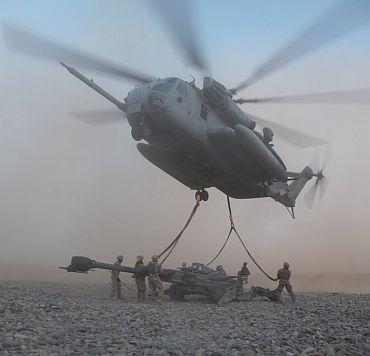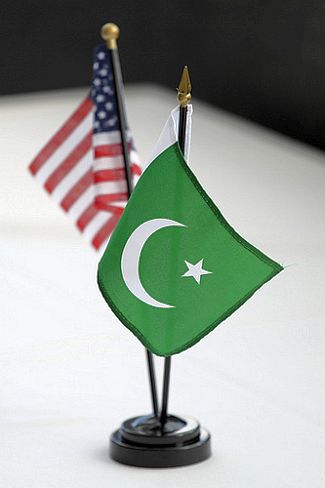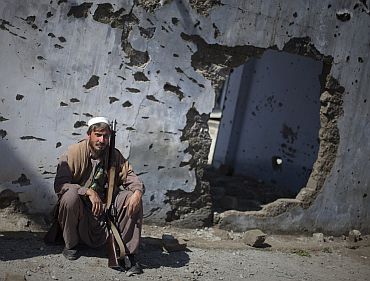
Senator Saxby Chambliss, member on the Senate Select Intelligence Committee, asked America's top intelligence chief how any reconciliation with the Taliban was possible considering the group was resilient and continued to enjoy sanctuary in Pakistan. Aziz Haniffa reports.
Senator Dianne Feinstein, the chairman of the powerful United States Senate Select Committee on Intelligence has said that "Pakistan is a very puzzling country" that despite thousands of its own killed by terrorists, continues to "walk both sides of the street," in the US-led war on terror.
In her hearing, convened by her committee on worldwide threats, where all of the intelligence chiefs of the various US agencies were called upon to testify, Feinstein, California Democrat, said, "To me, Pakistan is a very puzzling country. We know that thousands of Pakistanis have been killed by terrorists, and we suspect that what Pakistan is doing is trying to essentially; to use a vernacular, walk both sides of the street."
However, she acknowledged that "most of us believe that having a positive relationship with Pakistan as a nuclear power, a significant nuclear power, is very important."
But Feinstein said that the all-important question was how the US assesses this relationship, which has been going down the tubes in the past several months.
Meanwhile, the ranking Republican member on the committee, Senator Saxby Chambliss, cast doubt on the recent efforts by the Obama administration to negotiate with the Taliban. Chambliss said that the intelligence community's assessment was that the Taliban was now stronger than it ever was and continued to enjoy safe havens in Pakistan. The country offers them a distinct advantage in the battle with the US-led coalition forces that once again exposes the double-game that Pakistan was playing, said Chambliss.

Chambliss told James Clapper, director of national intelligence that "the intelligence community assesses, and Director Clapper, your statement for the record, underscores that the Taliban remains resilient and capable of challenging US and international goals in Afghanistan."
"The community also assesses that Taliban senior leaders continue to enjoy safe havens in Pakistan, which enables them to provide strategic direction to the insurgency in Afghanistan without fear for their safety," said Chambliss.
Chambliss asked America's top intelligence chief how any reconciliation with the Taliban could have any degree of success "considering that the group is resilient, maintains the ability to challenge the United States, and continues to enjoy sanctuary in Pakistan.
Clapper acknowledged that the relationship with Pakistan was indeed "a challenging relationship," but argued that it "is an important one for exactly the reason that you allude -- Pakistan is a nuclear power."
He said, "Pakistan and our interests are not always congruent. Their existential threat continues to be India. They have also paid a huge price because of the militancy that they have had in their country and have suffered literally thousands of casualties in that context. So sometimes our interests converge, and sometimes they differ."
However, Clapper reiterated that it was "crucial that we have one and have a positive relationship, even though we've gone through some trying times."
Retired General David Petraeus, now the director of the Central Intelligence Agency, echoing Clapper's sentiments, also argued that "the relationship is very important," but acknowledged, "The relationship right now is also quite strained."
...

Petraeus noted that "there's an awareness there (in Pakistan) as well that this is a critically important relationship, that there are areas of considerable mutual concern, mutual objectives, while there are also those, as Director Clapper noted -- ones in which there are diverging interests."
The CIA head also informed the committee that the political situation in Pakistan was in a state of flux and spoke of "tension between the supreme court, between the Army chief and the ISI (Inter-Services Intelligence) director and the government, the president and the prime minister. That may be calming a bit. There have been signs of that in recent days."
"Nonetheless, the situation, I think, as our British colleagues might say, is fraught, and it is going to take some time. It's going to take a lot of diplomacy, engagement and so forth to move forward in a relationship that's important to both our countries," he added.
But Petraeus said that "as a general comment -- we believe the relationship between the intelligence services is generally still productive. There is certainly good communication going back and forth, and there have been some important -- again, pursuit of important mutual objectives between the two services."
Clapper addressing the question of safe havens in Pakistan said that it was obviously part of the dialogue (with Pakistan). "But this is a case where historically, sometimes a good example, where our mutual interests don't always converge," Clapper said.
Petraeus said, "The record is obviously mixed. There has been progress against some of the extremist elements in the border regions that would include, obviously, Al Qaeda. When number one, two and three are removed from the picture in a single year, needless to say, that's a pretty significant accomplishment. But beyond that, it's important to note that back in October, for example, four of the top 20 in a single week were either captured or killed. And again, some of this has obviously been undertaken together."
...

"There's been progress by our Pakistani partners against the elements that have threatened their very existence. We should remember that a little over two-and-a-half-years ago it looked as if the Tehrik-i-Taliban Pakistani was going to continue to march right out of Swat valley and perhaps into the suburbs of Islamabad. They reversed that. They've fought very hard. They have taken significant casualties. And in so doing, they've also gone after some of the other elements allied with TTP in the Federally Administered Tribal Areas," said Petraeus.
He added, "On the other hand, there's been insufficient pressure on the Haqqani network, on some of the other elements. And then needless to say, the Afghan Taliban has not been pressured sufficiently in the sanctuaries that it enjoys in Baluchistan and in other areas as well."
But Senator Olympia Snowe, another Republican pressing Clapper on the safe havens question, asked him how the US could have a normal relationship with Pakistan when "so much of what we're doing in Afghanistan is predicated on effectively addressing and rooting out these safe havens, obviously."
Snowe also argued as to how there could be any viable relationship with Pakistan when of late Islamabad was "issuing threats about imposing taxes on the transit of our materials, both ours and NATO's, from their ports and roads to Afghanistan. So this is deeply troubling."
Clapper acknowledging the impact said, "This is getting into the policy realm, outside of intelligence -- but it's crucial that our dialogue proceed and that we find some way of converging on that issue as well."
Clapper said, "Pakistanis are a very proud people, and they've felt their sovereignty was assaulted in the Abbottabad raid, and of course the regrettable incident in November with the killing of the Pakistani troops on the border sort of heightens that. That has caused them to collectively reassess the relationship."
But he expressed that "in the end, I believe they realise they need a positive partnership with us. And hopefully, we'll work through these in such a way that we minimise the impact of these safe havens."